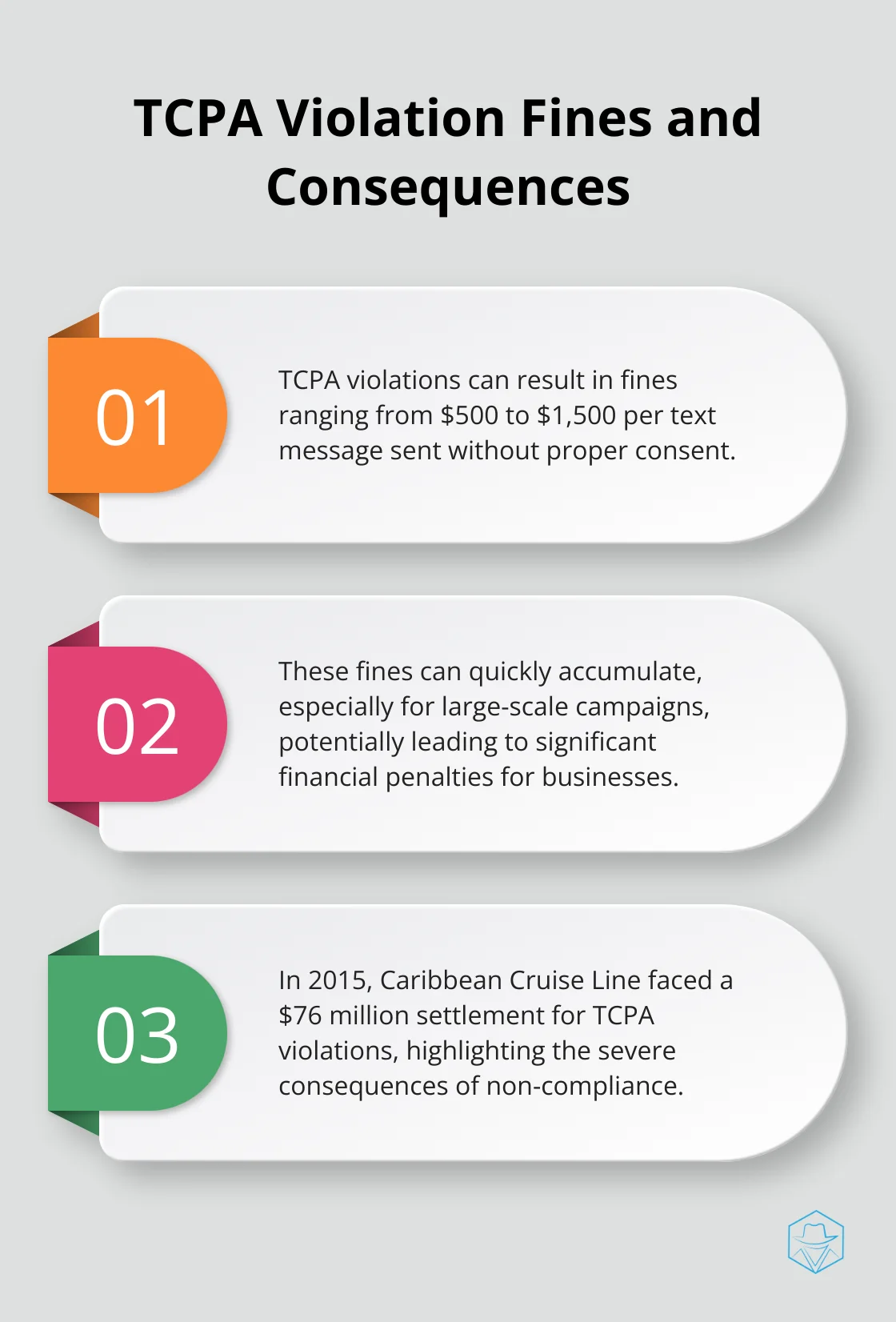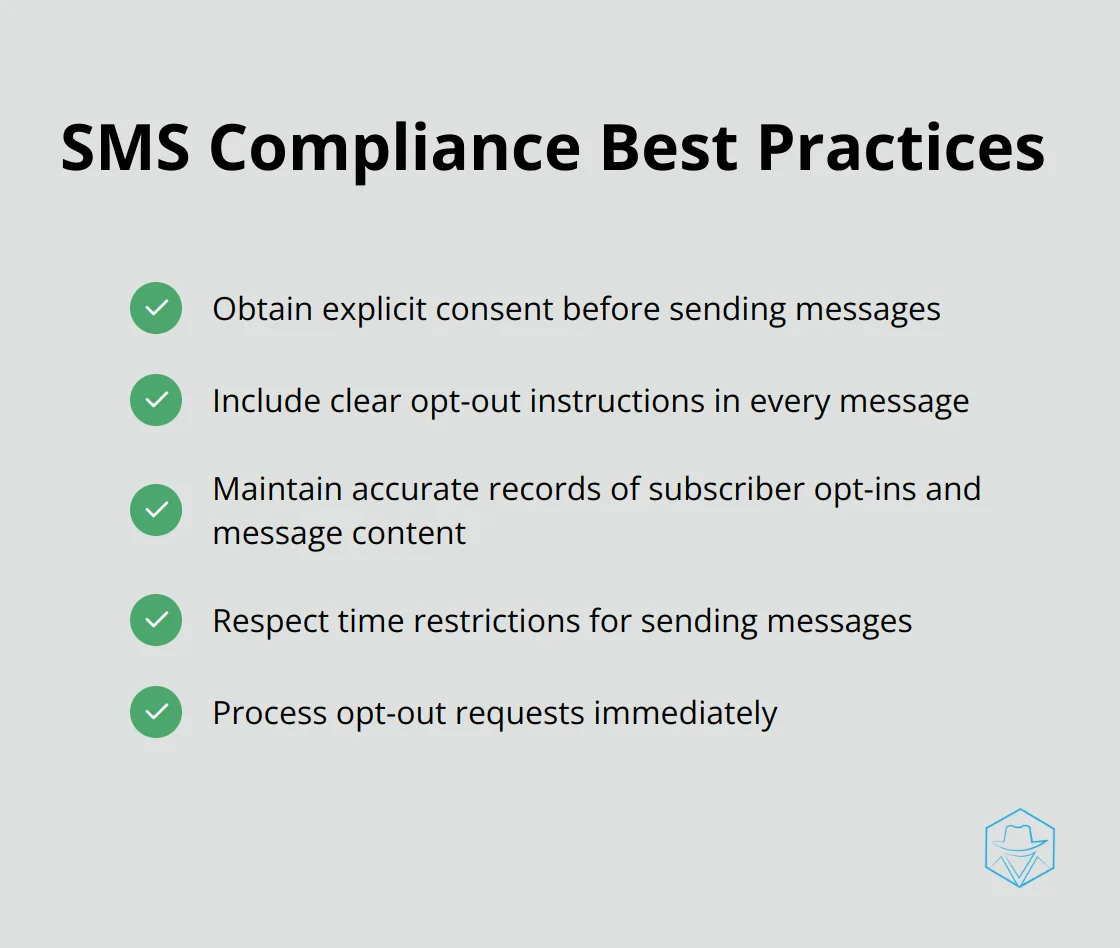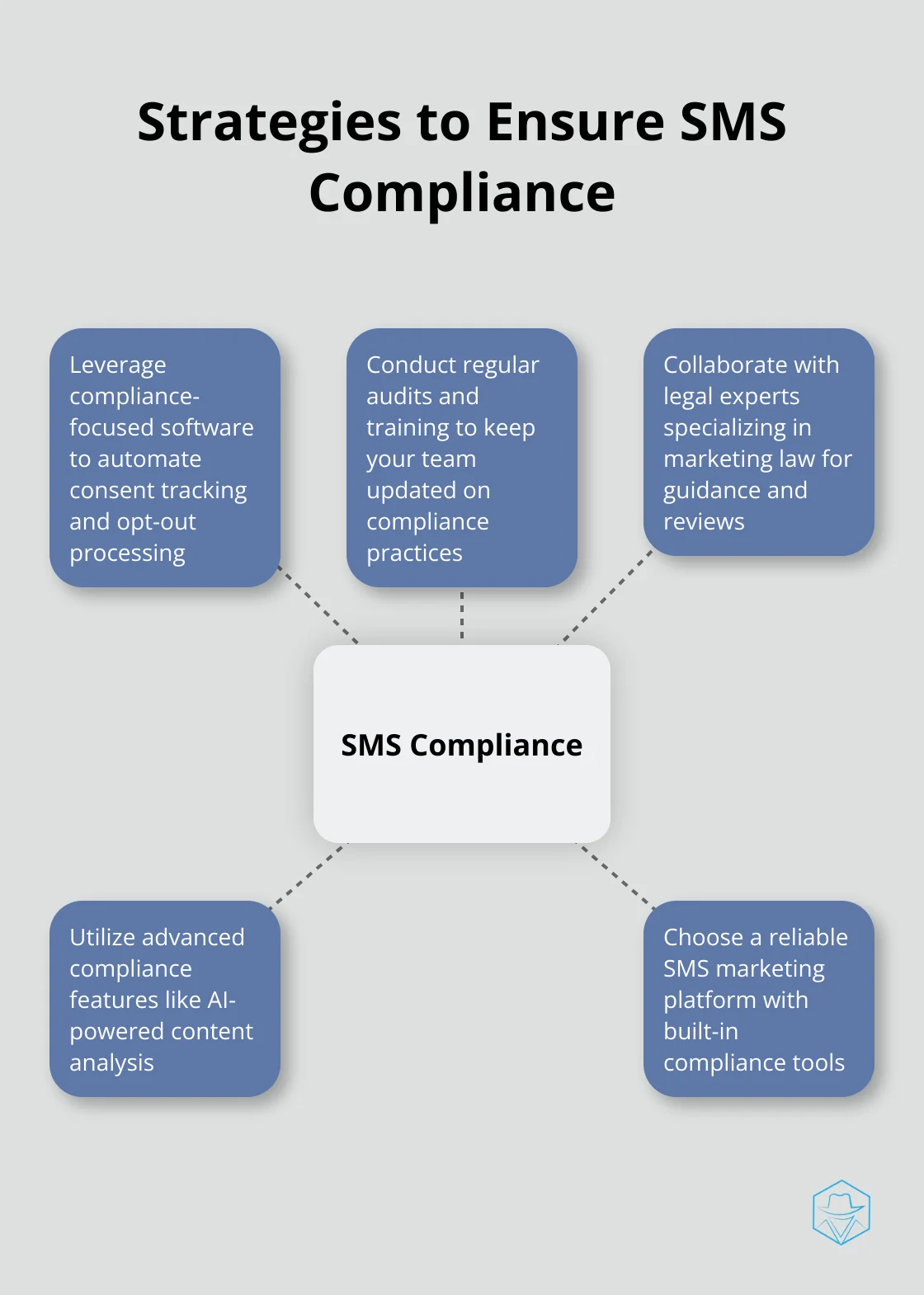Navigating SMS Compliance Laws for Marketing Campaigns [Guide]
![Navigating SMS Compliance Laws for Marketing Campaigns [Guide]](/blog/wp-content/uploads/emplibot/sms-compliance-hero-1755360409.webp)
SMS compliance is a critical aspect of modern marketing campaigns. With strict regulations in place, businesses must navigate a complex landscape to avoid hefty penalties and maintain customer trust.
At Drop Cowboy, we understand the challenges marketers face when implementing SMS strategies. This guide will walk you through the essential laws, best practices, and tools to keep your SMS marketing campaigns compliant and effective.
What Are the Key SMS Compliance Laws?
The Telephone Consumer Protection Act (TCPA)
The TCPA stands as the primary law governing SMS marketing in the United States. It requires businesses to obtain express written consent before sending marketing text messages. Your customers must actively agree to receive texts from you. A pre-checked box on a form doesn’t suffice – consent must be clear and specific.
The CAN-SPAM Act
While the CAN-SPAM Act primarily focuses on email, it also applies to commercial text messages. This law mandates that businesses provide a way for recipients to opt out of future messages and honor those requests promptly. You must also clearly identify yourself as the sender in every message.
Key Requirements for SMS Marketing
To maintain compliance, your SMS marketing campaigns must adhere to these requirements:
- Obtain explicit consent before sending messages
- Include clear opt-out instructions in every message
- Honor opt-out requests immediately
- Identify your business in each text
- Send messages only during allowed hours (typically 8 AM to 9 PM in the recipient’s time zone)
The Cost of Non-Compliance
The penalties for violating these laws can be severe. TCPA violations can result in fines of $500 to $1,500 per text message. In 2015, Caribbean Cruise Line faced a $76 million settlement for TCPA violations. These fines can quickly add up (especially for large-scale campaigns).

Beyond financial penalties, non-compliance can severely damage your brand’s reputation. Customers who feel their privacy has been violated will likely share their negative experiences, potentially leading to a loss of trust and business.
Staying Ahead of Compliance
SMS compliance laws are complex and can change. We recommend regular reviews of your SMS marketing practices with legal experts. Many businesses find it helpful to use platforms that offer built-in compliance features to help navigate these regulations effectively.
Compliance isn’t just about avoiding penalties – it’s about respecting your customers and building trust. Following these laws shows your audience that you value their privacy and preferences, which can lead to stronger, more positive relationships in the long run.
Now that we’ve covered the key SMS compliance laws, let’s explore the best practices for ensuring your marketing campaigns stay within these legal boundaries.
How to Implement SMS Compliance Best Practices
SMS compliance best practices form the foundation of successful marketing campaigns. These practices not only keep you within legal boundaries but also foster trust with your audience.

Obtain Explicit Consent
Explicit consent stands as the cornerstone of SMS compliance. Move beyond passive opt-ins or pre-checked boxes. Instead, use active opt-in methods where customers take a clear, affirmative action to join your SMS list.
Consider these effective methods:
- Keyword campaigns: Customers text a specific word to your number to opt in.
- Web forms: Use a clear checkbox (unchecked by default) that customers must actively select.
Always state clearly:
- The type of messages they’ll receive
- Message frequency
- That message and data rates may apply
This transparency aids compliance and sets clear expectations for your subscribers.
Create Clear Opt-Out Instructions
Include simple, straightforward opt-out instructions in every message. The most common method is to add “Text STOP to unsubscribe” at the end of your messages. Ensure your system recognizes common variations like “STOP,” “END,” “CANCEL,” or “UNSUBSCRIBE.”
Process opt-out requests immediately. Set up your system to automatically remove the number from your list upon receiving an opt-out request. This swift action shows respect for your customers’ preferences and maintains compliance with regulations.
Maintain Accurate Records
Proper record-keeping plays a vital role in SMS compliance. Keep detailed records of:
- When and how each subscriber opted in
- The exact content of sent messages
- Received and processed opt-out requests
These records serve two purposes:
- They provide evidence of compliance if you face a legal challenge.
- They help track campaign effectiveness and refine strategies over time.
Use a dedicated SMS marketing platform that automatically logs all these details. This approach saves time and reduces the risk of human error in record-keeping.
Respect Time Restrictions
Timing significantly impacts SMS marketing and compliance. Avoid sending messages outside of 8 AM to 9 PM in the recipient’s local time zone. To ensure you don’t disturb subscribers, try to send messages between 10 AM and 8 PM for optimal engagement and compliance.
Be mindful of frequency as well. Sending too many messages can lead to opt-outs and potential complaints. (A good rule of thumb is to limit messages to 2-4 per week, depending on your industry and audience preferences.)
These best practices create a robust foundation for compliant SMS marketing campaigns. However, implementing them effectively often requires the right tools and strategies. In the next section, we’ll explore the various tools and approaches that can help ensure your SMS campaigns remain compliant and effective.
How to Ensure SMS Compliance

Leverage Compliance-Focused Software
SMS compliance software serves as your primary defense against potential violations. These tools automate many aspects of compliance, from consent management to opt-out processing. Look for software that offers:
- Automated consent tracking
- Real-time opt-out processing
- Time zone management for message scheduling
- Customizable opt-in flows
Many platforms provide built-in templates for compliant messaging (which takes the guesswork out of crafting your SMS campaigns).
Conduct Regular Audits and Training
Compliance requires constant vigilance. We recommend quarterly reviews of your:
- Consent collection methods
- Opt-out processes
- Message content and timing
- Record-keeping practices
Pair these audits with ongoing training for your marketing team. The SMS compliance landscape changes, and your team must stay current. You can bring in experts for annual workshops or use online training resources to keep your staff informed.
Collaborate with Legal Experts
While compliance software and internal audits matter, nothing beats the insights of legal professionals who specialize in marketing law. Establish a relationship with a law firm experienced in TCPA and CAN-SPAM regulations. They can:
- Review your SMS marketing practices
- Provide guidance on complex compliance issues
- Help you navigate any legal challenges that arise
The cost of legal counsel often pales in comparison to potential fines for non-compliance. (In 2020, a major retailer faced a $9.3 million settlement for TCPA violations, which underscores the financial risks of non-compliance.)
Utilize Advanced Compliance Features
Look for SMS marketing platforms that go beyond basic compliance. Some advanced features to consider in your SMS marketing tool include:
- AI-powered content analysis to flag potentially non-compliant messages
- Integrated consent management systems
- Automated compliance reporting
These tools and strategies don’t just help you avoid penalties; they build a foundation for trustworthy, effective SMS marketing. Compliance isn’t just a legal requirement-it shows respect for your customers and builds lasting relationships.
Choose a Reliable SMS Marketing Platform
Select an SMS marketing platform that prioritizes compliance. Drop Cowboy, for instance, offers features like Smart Delivery™, which optimizes message delivery times based on recipient time zones (this ensures you never violate quiet hours regulations). The platform also provides detailed delivery reports, which help you maintain accurate records for compliance purposes.
Final Thoughts
SMS compliance forms the backbone of successful text message marketing. Businesses must adhere to key regulations, obtain explicit consent, and provide clear opt-out options to build trust with customers. Regular audits and team training help companies stay ahead of evolving requirements and maintain compliant practices.
The benefits of SMS compliance extend beyond avoiding penalties. It enhances brand reputation and leads to more effective marketing campaigns. When customers feel their privacy is respected, they engage more positively with messages.
For businesses aiming to maximize SMS marketing efforts while ensuring compliance, Drop Cowboy offers a comprehensive solution. Our platform simplifies the process of maintaining SMS compliance (through features like Smart Delivery™) while boosting customer engagement. We strive to help you build lasting relationships through respectful and effective digital communication.
blog-dropcowboy-com
Related posts

August 28, 2025
Why Automated Voicemail Campaigns Are a Game-Changer for Sales
Boost sales by engaging clients through automated voicemail campaigns. Enhance reach, save time, and improve customer engagement effortlessly.

May 8, 2025
Implementing Marketing Automation: Best Practices
Streamline success by implementing marketing automation with top-to-date best practices and real-world insights for your business strategy.

June 23, 2025
How Much Does SimpleTexting Cost?
Explore SimpleTexting pricing and uncover costs, features, and benefits to make informed decisions on your texting services in this comprehensive guide.

May 6, 2025
HubSpot vs Hootsuite: Social Media Tool Comparison
Compare HubSpot vs Hootsuite in this guide. Explore features, pricing, and ease of use to find the best social media tool for your business.

June 11, 2025
Google Display Ad Sizes: Which Formats Work Best?
Explore which Google Ads display size boosts engagement most effectively in your campaigns for optimal advertising results.

August 19, 2025
Expanding Your Reach with Global Message Delivery Solutions
Expand your reach with global messaging solutions. Discover practical tips for successful international communication and boost your brand impact.